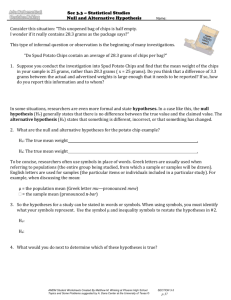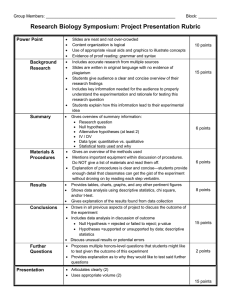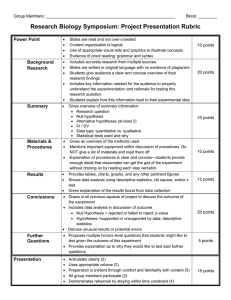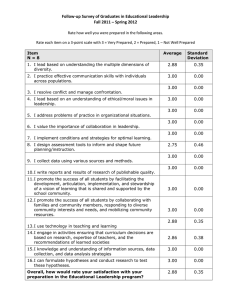Sec 3.3 – Null and Alternativ Consider this situation: “This unopened
advertisement
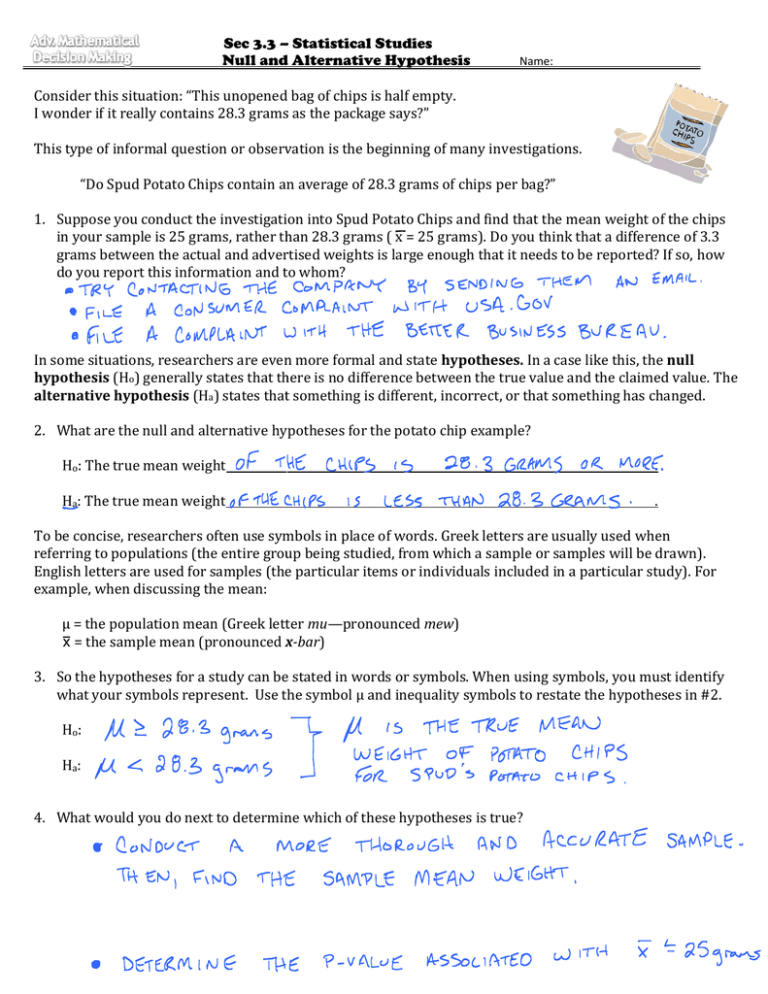
Sec 3.3 – Statistical Studies Null and Alternative Hypothesis Name: Consider this situation: “This unopened bag of chips is half empty. I wonder if it really contains 28.3 grams as the package says?” This type of informal question or observation is the beginning of many investigations. “Do Spud Potato Chips contain an average of 28.3 grams of chips per bag?” 1. Suppose you conduct the investigation into Spud Potato Chips and find that the mean weight of o the chips in your sample is 25 grams, rather than 28.3 grams ( x = 25 grams). Do you think that a difference of 3.3 grams between the actual and advertised weights is large enough that it needs to be reported? If so, how do you report this information and d to whom? In some situations, researchers are even more formal and state hypotheses. In a case like this, the null hypothesis (Ho) generally states that there is no difference between the true value and the claimed value. The alternative hypothesis (Ha) states that something is different, incorrect, or that something has changed. 2. What are the null and alternative hypotheses for the potato chip example? Ho: The true mean weight . Ha: The true mean weight . To be concise, researchers often use symbols in place of words. Greek letters are usually used when referring to populations (the entire group being studied, from which a sample or samples will be drawn). English letters are used for samples (the particular items or individuals individuals included in a particular study). For example, when discussing the mean: μ = the population mean (Greek letter mu—pronounced mew) = the sample mean (pronounced x-bar) x 3. So the hypotheses for a study can be stated in words or symbols. When using symbols, you must identify what your symbols represent. Use the symbol μ and inequality symbols to restate the hypotheses in #2. H o: Ha: 4. What would you do next to determine which of these hypotheses is true? For Questions 5 through 9, practice writing hypotheses. Write them in words and then convert them to symbols. Finally, sketch or outline a simple study design that might help study the hypotheses. 5. A local pizza shop advertises “an average delivery time of 20 minutes or less,” but it does not ot offer a guarantee such as a free pizza. The national manager, Su Lin, wonders if her employees are fulfilling the claim. 6. James believes that his mother’s houseplants would grow taller if she watered with rainwater instead of tap water. 7. According ding to the 2005 U.S. Census Bureau, at least 10.2% of registered births in the United States in 2005 were to teenage mothers. A sociologist believes that this percentage has increased since then. 8. According to the Federal Housing Finance Board, the mean price of a single-family single family home in 2005 was $299,800. A real estate broker believes that because of recent down turn in home sales that the mean price has decreased since then. 9. Justin flipped a spun a penny from 1985 eight times and got the results T, T, T, T, T, T, T, T. He believes the penny might be defective and the probability of landing on Tails this way is greater than 50%. (Try experimenting with this. You ou might be surprised what happens happens with all pennies 1985 and before)
